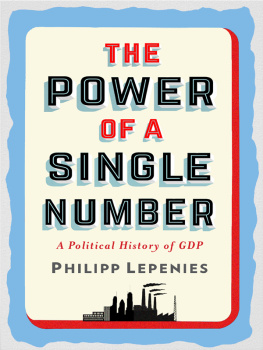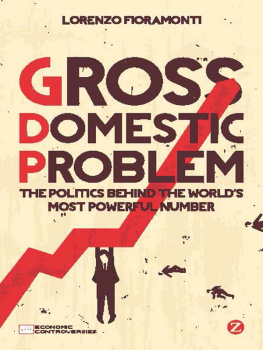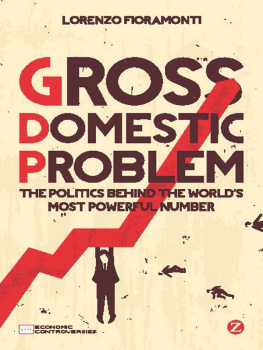Table of Contents
THE POWER OF A SINGLE NUMBER
THE POWER OF A SINGLE NUMBER
A Political History of GDP
PHILIPP LEPENIES
TRANSLATED BY JEREMY GAINES
COLUMBIA UNIVERSITY PRESS | NEW YORK
Columbia University Press
Publishers Since 1893
New York Chichester, West Sussex
cup.columbia.edu
Die Macht der einen Zahl: Eine politische Geschichte des
Bruttoinlandsprodukts 2013 Suhrkamp Verlag Berlin
English translation 2016 Columbia University Press
All rights reserved
E-ISBN 978-0-231-54143-5
The English translation of this text was financed by a grant from the Institute for Advanced Sustainablity Studies (IASS), Potsdam.
Library of Congress Cataloging-in-Publication Data
Names: Lepenies, Philipp, 1971author.
Title: The power of a single number : a political history of GDP /
Philipp Lepenies ; translated by Jeremy Gaines.
Other titles: Macht der einen Zahl. English
Description: New York : Columbia University Press, 2016. | Includes bibliographical references and index.
Identifiers: LCCN 2015034785 | ISBN 9780231175104 (cloth : alk. paper) | ISBN 9780231541435 (e-book)
Subjects: LCSH: Gross domestic productPolitical aspectsHistory.
Classification: LCC HC79.15 L4613 2016 | DDC 339.3/109dc23
LC record available at http://lccn.loc.gov/2015034785
A Columbia University Press E-book.
CUP would be pleased to hear about your reading experience with this e-book at .
Cover design by Noah Arlow.
References to Internet Web sites (URLs) were accurate at the time of writing. Neither the author nor Columbia University Press is responsible for URLs that may have expired or changed since the manuscript was prepared.
paralleled with a grant
Figure Foundation
CONTENTS
G ross domestic product (GDP) is the most powerful statistical figure in human history. No other indicator has ever had such an impact. At first glance, GDP is simply the measure of a countrys economic output, the value of all goods and services produced in a specific period, expressed as a number. However, GDP is far more than a mere statistic. Together with growth, which describes its rate of change, GDP serves as the key indicator of development and progress. Positive GDP growth is both the express objective of almost all governments and is often considered the only possible way out of an economic crisis. The global economy and global politics are largely defined by GDP.
Yet, GDP is not a self-explanatory figure like the temperature in Fahrenheit, last years CO2 emissions in tons, or the total calories of your breakfast. Instead, it is a calculation method that includes certain economic aspects but excludes others. It relies on a convention, on one interpretation of what we understand output and the economy to be.
GDP is a unique metric: economic activities are translated into numbers, added up according to predetermined rules, and aggregated as a single money value. In reality, this quite literally and most emphatically is a matter of political arithmetic: GDP is not only calculated on behalf of the government; it also feeds back into government actions. It enables governing by numbers.
For the U.S. Department of Commerce, GDP counts as one of the greatest inventions of the twentieth century, On the one side, there are those who vilify GDP and the exclusive focus on growth, while, on the other, there are the advocates who, at most, would accept slight tweaks to the methodology for measuring GDP, but otherwise continue to sing their high praise for growth. However, on both sides there is no doubt that GDP is of central importance to our political culture.
How did it come about that GDP now has such powers? How could a statistical construct that was completely unknown before World War II triumph over all else? These are the kind of questions this book sets out to answer. It traces the history of GDPor, to be precise, the genesis and onward march of the idea of the gross national product (GNP) and, to a certain extent, the older idea of national income. In the 1990s, GDP replaced the concept of gross national product, customarily used since the end of World War II as the key economic and political statistical indicator. The variables differ only in the details, which are of subordinate importance here. For this reason, I shall simplify and refer mostly to GDP, although historically speaking, it would be more accurate to use the term gross national product.
GDPs special position results from its political acceptance. For this reason, it is crucial to identify the point in time and the circumstances that led to the recognition of gross national product as a meaningful technology of government and then the definitive emergence of its calculation as a matter of political arithmetic.
This book does not seek to offer a comprehensive history of national accounts, as that has already been written by others. It focuses instead on the political contexts in which GDP arose and the decisive episodes in which it gained sway. This will better allow us to grasp the unique complexity of that history, the traditions on which GDP is based, and the precursors to it. The starting point here is not only the astonishment that Sarkozy expresses, at the power that GDP exerts today, but, above all, the lack of this historical perspective in current attempts to change it, supplement it, or even topple it, as many wish.
Three people play key roles in the political history of GDP: William Petty, Colin Clark, and Simon Kuznets. Pettys attempts, in seventeenth-century England, to transform naked figures into politically relevant data and thus into an instrument of power (a political arithmetic) constitutes an important historical precursor to GDP. Clark was an ingenious lone wolf, an English chemist who, after the Great Depression, was frustrated by the lack of macroeconomic data and who, working on his own, laid many of the foundations for the calculation of GDP. Kuznets was born in Russia and relied on his experiences in the early days of the Soviet Union to produce a systematic calculation of national accounts; he did this at the same time as Clark, with the signal difference that Kuznetss work was explicitly commissioned by government.
No one doubts the importance of Petty, Clark, and Kuznets. Yet, there is a touch of tragedy about the role they played; despite their importance to the history of GDP, none succeeded in convincing others of their methodologies during their lifetimes. The history of GDP is also an object lesson in the circumstances under which ideas can have political effect. Ideologies exerted an influence here, as did extreme events such as the Great Depression and World War II. And without John Maynard Keynes, who drew heavily on the work of both Clark and Kuznets, the history of GDP would have been very different.
The complex history of GDP shows how the number gained such an incredible power and the reasons for its triumph: namely, GDP proved itself in times of crisis, emerged as an international norm, and rested on a belief in the utility of political arithmetic. And the history of the measure, above all, makes it clear that the notion of GDP and the ideal of growth is aligned to a set of political values that were originally intended to solve the problems of war and of the immediate postwar years.














